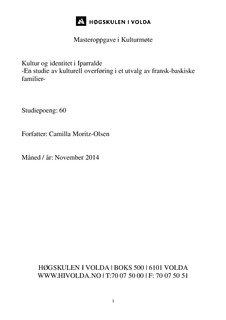| dc.description.abstract | Summary
This master theses is a study on the transmission and developing of Basque culture and language within Basque families in the French Basque Country. France has since the revolution in 1789 been perceived as a centralist and uniform state, with French as its official language. However France is a state with several regions which have their own local languages, traditions and history. This project is a study on how a selection of informants who identify themselves with Basque culture sustain and develop their cultural specificity along with the influences from the French majority society. The basque language, Euskara, is a minor language on the world scale and is therefore on the UNESCO's list over threatened languages. Only about 51000 inhabitants in the French part of the Basque country, called Iparralde in Euskara, practice it today. Since this language has no official status in France, the use of Euskara in public is limited within mass media, literature, trade, and in public administration. Euskara is therefore a language which is mostly used at home, within the families or at school, either in the Basque private schools, called Ikastola, or in some degree at the public bilingual schools. As this study will show, Euskara, is for my informants a key element in the Basque culture. The informants have described this language as a matter of great importance for their definition of Basque identity as well as their connection to the region through their family history and traditions. Even if Euskara is an essential part of the Basque culture, some of the informants also emphasise the significant influences of traditional Basque activities within dance, music and celebrations. For some informants, these activities are part of their cultural and educational upbringing in which they have been participating during their own childhood. As a consequence they would like their own children to be able to partake in the same experience. In this way; keeping their culture alive, there is also a possibility for them to feel connected to a Basque collective identity. It is an impossible task for a family alone to be a cultural transmitter. Since Euskara is not largely used, the parents who want their children to be aware of Basque history and culture, depend on a variety of organisations related to both education and leisure to be able to give their children a possibility to speak and learn Euskara outside the home. When it comes to education, the Ikastola schools have a significant role since they are the only schools that provide all the teaching, tuition and lessons in Basque. | nb_NO |
